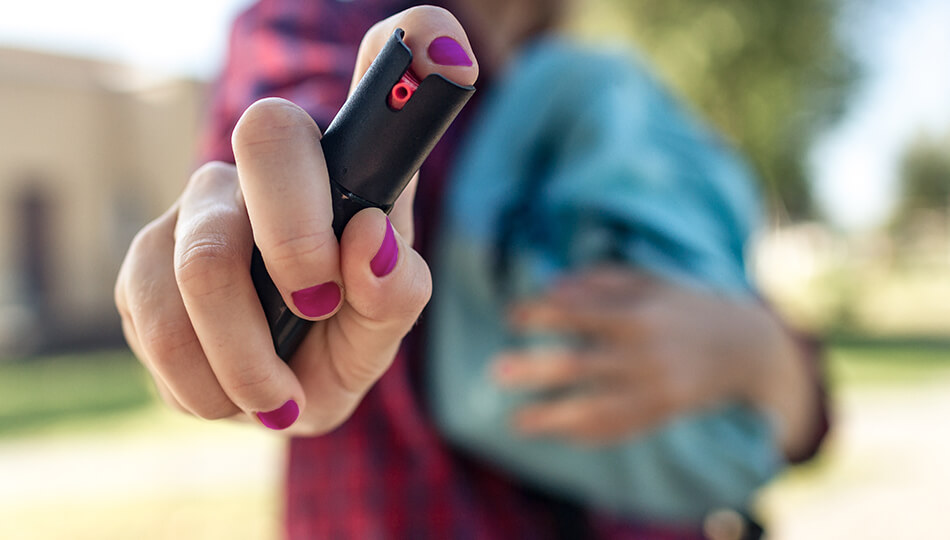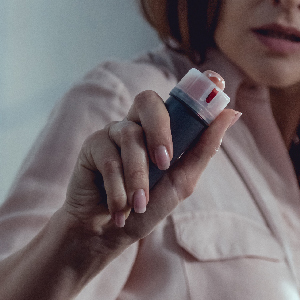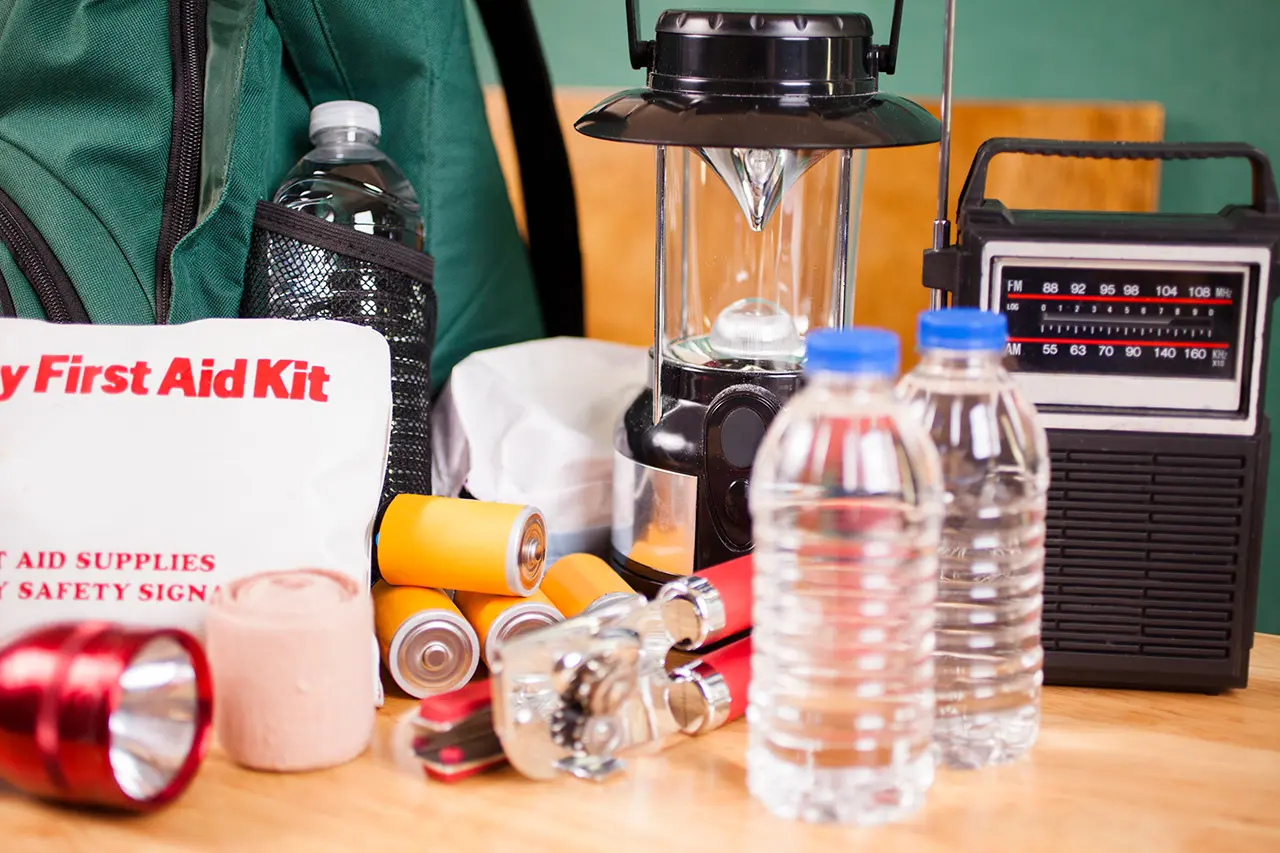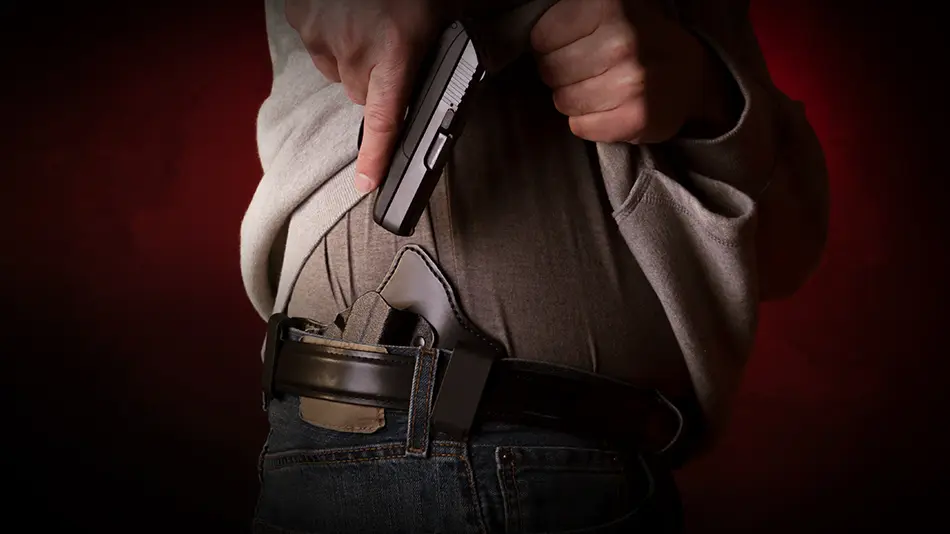
No matter what time of year it is, college campuses can be difficult to navigate. With just a simple glance at the headlines, it’s obvious that college students are facing uncertainty and some unsafe situations. If you’re wondering what options you or your child have for self-defense on campus, you’ve come to the right place. These are the possible secondary defensive measures college students might be able to use on campus.
Does Pepper Spray Work?
Although the right pepper spray can be a legitimate secondary self-defense tool, it needs to be used correctly (and effective products must be utilized).  A big mistake many parents make is handing their child – usually their daughter – a canister of pepper spray with the advice to “be safe.” There’s more to pepper spray than a spicy version of spray-and-pray, though.
A big mistake many parents make is handing their child – usually their daughter – a canister of pepper spray with the advice to “be safe.” There’s more to pepper spray than a spicy version of spray-and-pray, though.
Two quality brands currently on the market are SABRE Red and POM. All pepper spray is not the same, and these are simply two of the brands seeing common use in professional fields at this time. Pepper sprays like SABRE Redare derived from Oleoresin Capsicum (OC, as in “OC Spray”). Countless members of law enforcement and experienced self-defense instructors recommend SABRE Red, specifically. There are companies on the market that will claim their higher percentage of OC means their spray is a more effective self-defense tool, but in reality, it’s not the percentage of OC it’s the consistency of heat produced by the formula.
From the Sabre Red website:
“Major capsaicinoids are the true heat measure and can only be guaranteed through High-Performance Liquid Chromatography (HPLC) testing – and, again, we’re the only brand that does. The only pepper sprays that are government regulated (by the EPA and Health Canada) are animal pepper sprays. Dog sprays range from 0.25% to 1.0% major capsaicinoids and bear sprays range from 1.0% to 2.0% major capsaicinoids. WARNING: Do not purchase pepper spray without checking its content of major capsaicinoids.”
It’s a good idea to use a canister of practice spray first to familiarize yourself with the feel and operation of the canister and so you know the effective distance of the spray.
Do Martial Arts Work?
 Being in good shape is certainly a boost to your ability to defend yourself. However, the idea that martial arts training makes you fully capable of defending yourself against a violent attack is inaccurate. Although it can help, it’s no guarantee you’ll be able to act in time or within the space available with no notice. Also, sports like boxing, as fun as they are and as well as they contribute to overall fitness, are not necessarily useful when your child is fighting for their life. If all you train in is boxing, it can be hard to orient yourself if and when you’re taken off your feet.
Being in good shape is certainly a boost to your ability to defend yourself. However, the idea that martial arts training makes you fully capable of defending yourself against a violent attack is inaccurate. Although it can help, it’s no guarantee you’ll be able to act in time or within the space available with no notice. Also, sports like boxing, as fun as they are and as well as they contribute to overall fitness, are not necessarily useful when your child is fighting for their life. If all you train in is boxing, it can be hard to orient yourself if and when you’re taken off your feet.
Bottom line is that a background and current work in martial arts will give your college student a boost in the self-defense arena, but it should not be the only skill they depend upon for their protection.
Can College Students Carry Guns?
Generally, firearms are not allowed on college campuses. There are some states that allow them, but they are few and far between. Other local laws regarding age and carry method must be followed as well.
Enjoying this content? Find out how you can get more sent straight to your inbox.
What Doesn’t Work for Self-Defense?
There are a lot of recommended self-defense methods that are a bad idea. As a general rule, experienced instructors agree certain methods are not a good idea. Those include, but are not limited to:
- Keys between your fingers. This can and will shred and potentially break your fingers if you attempt to use them for self-defense in that way.
- Whistles. An attacker is unlikely to be phased by a whistle and the general public is extremely likely to ignore it.
- Yelling “rape.” It’s far more effective to scream “fire” because the general public has been conditioned to respond to that word with speed.
- Stomping on insteps. The idea that you can simply stomp on someone’s foot to halt an attack is a poor one. This goes for the majority of physical force advised on YouTube and various websites. If you are a woman, you are highly unlikely to be capable of fighting off an attacker without a self-defense tool of some sort. It doesn’t mean you shouldn’t try, but be aware of the significant limitations of these things.
- Striking with your purse. In a fight for your life, you do whatever possible to get away and survive. But if hitting someone with your purse is your only plan, find a better plan.
- Clawing with fingernails. This is a good way to potentially mark an attacker for later identification and can give you some of their DNA under your nails, but odds are not in your favor that it will do anything to halt an attack.
- Urinating on yourself. This is not an effective self-defense measure.
- The “Brutus” keychain design. This is a keychain styled to look like a dog’s face. To use it, you put your fingers in the “eye” holes and strike with the pointed ears. This can not only break your fingers, but requires extreme close contact, and is largely ineffective.
What Self-Defense Can Work for College Students?
- High-quality pepper spray
- SABRE Red or POM.
- Kubotan/Persuader/mini-baton
- Firearms, where legal
- Physical fitness
- Force-on-force classes
This may seem like a short list, and it is. However, there are other things a college student can do to stay safe:
- Body language. Head up, eyes scanning, be alert and unapproachable.
- Situational awareness. Not only do you look like you’re paying attention, but you truly are paying attention to everything and everyone around you at all times.
- One part of awareness many college students miss is that they should not simply open their door just because someone knocks. Have a way to see who is out there before removing that barrier.
- Command voice. Master your “command voice,” but try not to fall back on “rape” or “help.” Sometimes using your voice and words well buys you a second to fight back or the escape you might not have otherwise had.
- Travel in groups.
- Never leave drinks unattended or accept drinks from strangers.
- Mentality. Being mentally prepared beforehand matters a great deal. Remember: you are a fighter.
Understand it can happen, so have a plan. As the late Dr. William Aprill said, “Your understanding and consent are not required for someone to take your life, kill your loved ones, and destroy all you hold dear.”
Your Protection Starts Here!
The information provided in this publication is intended to provide general information to individuals and is not legal advice. The information included in this publication may not be quoted or referred to in any other publication without the prior written consent of U.S. LawShield, to be given or withheld at our discretion. The information is not a substitute for, and does not replace the advice or representation of a licensed attorney. We strive to ensure the information included in this publication is accurate and current, however, no claim is made to the accuracy of the information and we are not responsible for any consequences that may result from the use of information in this publication. The use of this publication does not create an attorney-client relationship between U.S. LawShield, any independent program attorney, and any individual.





Leave A Comment